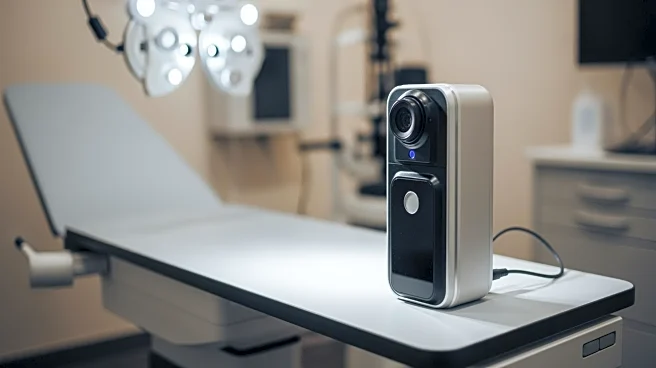What's Happening?
Professor Emmanuel Balogun from Ahmadu Bello University (ABU) has led a study validating the Smart Eye Camera (SEC) as a reliable, low-cost device for eye care in Nigeria. The research, conducted with
international collaborators, demonstrated that the SEC, a smartphone-mounted diagnostic tool, can effectively replace traditional slit-lamp microscopes in eye examinations. The device achieved up to 96% diagnostic accuracy in trials, offering a cost-effective solution for detecting eye conditions such as cataracts and corneal ulcers. The SEC's affordability and portability make it particularly valuable for rural and underserved communities.
Why It's Important?
The validation of the Smart Eye Camera represents a significant advancement in accessible healthcare technology, particularly in regions with limited access to ophthalmologists. By reducing the cost of eye examinations, the SEC has the potential to improve eye care delivery and prevent blindness in Nigeria, where over 1.13 million people are blind. The device's ability to support telemedicine and real-time data sharing enhances its utility in remote areas, contributing to better health outcomes and reducing healthcare disparities.
What's Next?
Professor Balogun and his partners are seeking investment to establish local production of the Smart Eye Camera in Nigeria, aiming to position the country as a leader in eye-care technology manufacturing in Africa. This initiative could stimulate economic growth and create job opportunities in the healthcare technology sector. The widespread adoption of the SEC may also encourage further innovation in medical devices tailored to the needs of developing countries.
Beyond the Headlines
The development and validation of the Smart Eye Camera highlight the importance of international collaboration in advancing healthcare technology. Ethical considerations regarding the accessibility and affordability of medical devices in low-income regions are crucial for ensuring equitable healthcare delivery. The success of the SEC may inspire similar initiatives in other areas of healthcare, promoting technological solutions to global health challenges.








